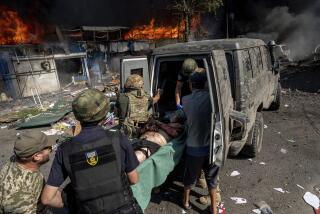PERSPECTIVE ON ETHNIC CONFLICT : Keeping the Lid on Future Bosnias : The world has no means for stemming such strife; early warnings are needed, then preventive measures.
- Share via
The continuing agony of Bosnia points up an unfortunate fact: Ethnic and religious conflicts threaten world order, and neither governments nor international organizations are able to respond adequately.
The difficulty is partly conceptual. The international system is structured to handle relations among states, not disputes among ethnic groups. Almost without exception, existing institutions were not set up to manage ethnic conflict; armies have not planned for it; civil authorities were not trained for it.
Given the failure in Bosnia and the number of other disputes on the brink of exploding, the international community would be wise to place the highest priority on developing means to defuse and prevent ethnic conflict.
Obviously, by far the best time to deal with such conflicts is before they reach crisis proportions. Once widespread fighting occurs, only costly military intervention seems sufficient to stop the carnage.
In the case of Yugoslavia, there was considerable early warning. CIA analysts predicted disintegration three years ago, and academic experts foresaw violence. If preventive measures had been implemented at the first signs of trouble, there would have been a reasonable chance that some or all of the violence might have been avoided.
The future challenge is twofold. First, early warning must be heeded. A key problem is getting the policy-makers to take action or to assign adequate resources to conflicts that are not yet out of control.
Second, there should be available a package of preventive measures. Most of these already exist in some form, but they need to be thought of as part of a whole arsenal and applied in a coordinated way. The aim is to create within divided societies a climate in which conflict is resolved peacefully and grievances are resolved in an equitable way. The package might include some or all of the following components:
* Proactive mediation. Skilled, prestigious mediators should be available in the pre-violence stage, from international bodies like the United Nations, from non-governmental organizations like former President Jimmy Carter’s International Negotiation Network and from governments.
* Preventive diplomacy. In addition to mediation, the same forms of pressure--whether political, economic or related to foreign aid or military sales--that diplomats and policy-makers once applied to keep nations from going communist should now be used to prevent ethnic bloodshed.
* Military force. Ironically, peaceful solutions may require a credible threat that outside force will be used--and not only as a last resort.
* Military and civilian observers. In June, 300 American troops joined the U.N. force of observers in Macedonia. Their main function is to prevent ethnic warfare from spilling over from other parts of former Yugoslavia. In addition, there was, until their recent expulsion by Serbian authorities, a small group of civilian observers in Kosovo to report on human-rights abuses. The presence of outside observers, both military and civilian, can serve as a deterrent to violence.
* Public information. The media in the former Yugoslavia played an important part in exacerbating ethnic hatred, and there were few alternative sources of news. Government information services, such as the U.S. Information Agency, the British Council and Radio Free Europe need to reorient themselves toward a conflict-prevention mission.
* Internal mechanisms for mediation. Most post-communist societies have little experience in solving disputes without force. Non-governmental and international organizations should provide aid to these countries in establishing systems and training programs for mediation and collaborative problem-solving.
* Research on ethnic issues. Just as East and West once put huge resources into developing new weapons, the international community should now encourage its best minds to develop ways to prevent ethnic conflict. There should be a concerted research effort to understand the underlying historical and cultural motivations that contribute to conflict.
While all of the above would require money, the price of prevention is small--especially when compared with the huge loss of life and financial cost of ethnic warfare.
More to Read
Sign up for Essential California
The most important California stories and recommendations in your inbox every morning.
You may occasionally receive promotional content from the Los Angeles Times.










